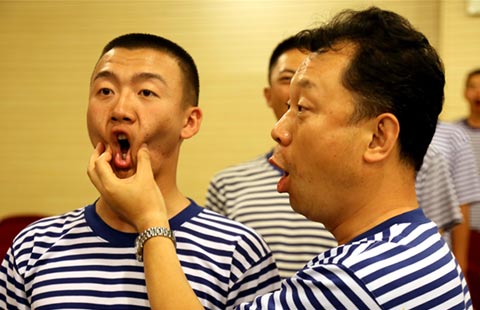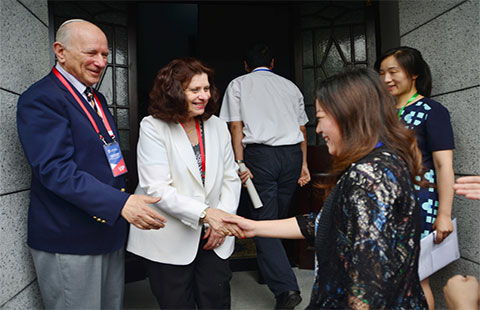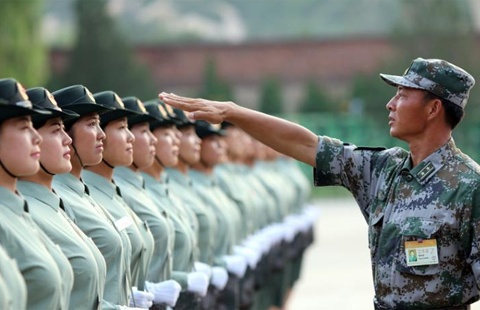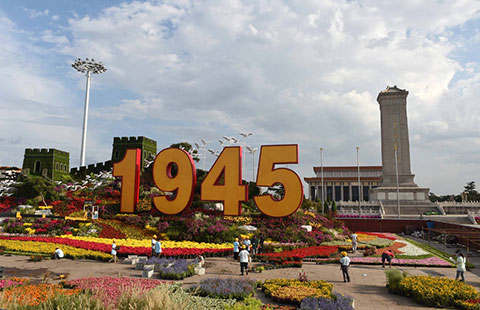US' candidates have nothing to offer have-nots
Updated: 2015-08-28 07:49
By Chen Weihua(China Daily)
|
||||||||
 |
|
Republican presidential candidate Donald Trump talks to reporters as he arrives in Laredo, Texas July 23, 2015.[Photo/Agencies] |
Of all the Republican and Democrat candidates in the 2016 US presidential race, almost each and every of them claims that he or she will fight for Main Street not Wall Street, despite the fact that big businesses often finance most of the campaigns.
A Gallup poll released last week may well explain why these candidates, in a bid to win votes, are so eager to pledge that they will be the true savior of less-advantaged Americans.
The survey finds that only 58 percent of Americans see themselves as "haves" while 38 percent regard themselves as "have-nots". The percentage of have-nots has more than doubled since 1988, but has been more stable in recent years.
And 45 percent of the people in the survey say they think the US society has been divided into groups of haves and have-nots, compared with only 26 percent in 1988.
These findings came after a May survey which showed that 63 percent of Americans say money and wealth distribution is unfair in the United States.
It is not hard for someone living in Washington to see the have-nots. Just around my office in the National Press Building or the DuPont Circle on my way home or under an overpass passing the Rock Creek Park, homeless people are a daily scene, even amid the snows of winter.
On any given night, there are 7,784 homeless people in the District of Columbia, according to the Community Partnership for the Prevention of Homelessness.
African-Americans are among the most underprivileged groups, as revealed by both the survey and their frustrations vented during the recent protests in many US cities.
While class struggle was a catchphrase in China during the "cultural revolution" (1966-76) and income inequality is also challenging China today, there is no doubt that there is also a very real class struggle in the US today, despite the fact that US officials and mainstream news media never use such a politically incorrect term.
- US presidential election will not affect Sino-American ties
- Donald Trump atop GOP field for 2016 US presidential election
- Hillary Clinton still a strong candidate in 2016 US election
- Chinese VP meets US-China business council members
- US-China entities work on green project
- US-China climate change cooperation 'closer than ever before'
- Hungary scrambles to confront migrant influx
- Turkey to hold snap parliamentary election
- Caroline Kennedy used personal email for official business
- Czech appeals for closing Schengen external border
- DPRK says inter-Korean contact gives lesson to South Korea
- Trial starts for Chinese scholar expelled from Norway

 Hairdos steal the limelight at the Beijing World Championships
Hairdos steal the limelight at the Beijing World Championships
 Chorus of the PLA gears up for Sept 3 parade
Chorus of the PLA gears up for Sept 3 parade
 Iconic Jewish cafe 'White Horse Coffee' reopens for business
Iconic Jewish cafe 'White Horse Coffee' reopens for business
 Beijing int'l book fair opens new page
Beijing int'l book fair opens new page
 Top 10 Asia's richest tech billionaires in 2015
Top 10 Asia's richest tech billionaires in 2015
 Female honor guards train for military parade debut
Female honor guards train for military parade debut
 Floral replica of the Great Wall appears on Tian'anmen Square
Floral replica of the Great Wall appears on Tian'anmen Square
 Chinese long jumpers leap to history
Chinese long jumpers leap to history
Most Viewed
Editor's Picks

|

|

|

|

|

|
Today's Top News
China not the only reason global stock markets are in a tailspin
Market woes expected to delay Fed hike
Gunman had history of workplace issues
11 under probe and 12 detained over Tianjin blasts
War anniversary: Britons born in captivity, raised in freedom
Too hard to say goodbye to Tibet: China's Jane Goodall
Two US TV journalists fatally shot on air
Smaller cub died at National Zoo
US Weekly

|

|







